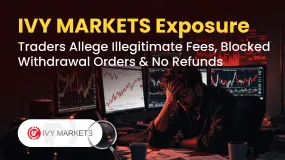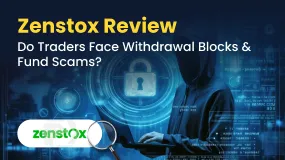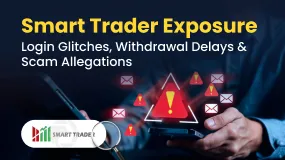Abstract:Chief Trading Strategist from CMTrading, has been trading on the financial markets for well over 20 years. And as Africa’s largest brokerage celebrates its 10th anniversary, Razak shares some of his top tips for aspiring traders.
There has been news aplenty about an onslaught of investment scams since the start of 2022, from popular shows on Netflix glorifying the brazen tales of ‘swindlers’, to home-ground stories about opportunists fleecing individuals as well as businesses.

According to the South African Banking Risk Information Centre (SABRIC), South Africans lost more than R1.5 billion collectively in banking and card fraud alone in 2020 (latest available data). Add other scams into the mix, along with victims who are too ashamed to report being targeted, and that number is likely to be significantly higher.
The latest warning comes from the Financial Sector Conduct Authority (FSCA) about a South African man who allegedly defrauded over 600 investors, some of whom lost more than R1 million, following claims that investors could double their money in three months trading foreign exchange. And then the headline-grabbing news about a businesswomen allegedly defrauding hundreds of would-be holidaymakers. Add to this a scam circulating in which fraudsters are masquerading as South African Revenue Service officials claiming to have “tax refunds” and/or letters of summons, encouraging recipients to hand over their personal and bank account information.
Phiko Peter, client relationship manager from Allan Gray, says that consumers have been hit hard financially, with shocking fuel price escalation and food price increases. This, together, with our need for quick results, makes for fertile hunting ground for crafty criminals.
“These factors make us even more susceptible to fraudulent ”special offers“ and get-rich-quick schemes. On top of this, technology has made instant investing more accessible. Unfortunately, fraudsters are giving old-fashioned scams a digital makeover and using online channels to fleece their victims.”
Below Peter shares the popular investment scams, and how to protect yourself from becoming a victim.
The new age pyramid scheme
The rise of social media has merely given fraudsters easier access to social networks, but the scam is essentially the same: A charismatic con artist introduces an amazing financial opportunity that promises unbelievable returns to a small group of investors. Each investor is then encouraged to sign up and recruit new investors (friends, family, acquaintances, and colleagues). In turn these new investors recruit even more investors, and a multi-level pyramid structure is formed, with the fraudster firmly on top.
Initially, investors may receive great returns and can confidently assure new recruits that the investment will pay off. However, these schemes are not sustainable. As soon as the pool of new investors and additional investments dries up, the scheme is unable to provide returns to its investors and inevitably collapses, leaving investors with permanent capital losses.
“In the digital age, these schemes are administered on messaging platforms like WhatsApp, which has proven useful for con artists, who can now communicate efficiently and encourage recruitment with relative anonymity. With the help of digital payments, these schemes operate efficiently. By the time the scheme unravels, and the truth is revealed, its too late,” he cautions.
The money-flipping scam
Money-flipping scams have ripped off many local investors through social networks like Facebook, Twitter and Instagram.
Money-flipping scams promise to double or triple your money in a very short period. Victims are convinced to send funds to a scammer who promises to deliver excellent returns for a small commission. In South Africa, these investment opportunities are often sold as forex trading, binary options or offshore property opportunities.
To pull off this scam via social media, a scammer will create a legitimate-looking social media profile showcasing exotic travel destinations, expensive cars and designer clothing. These opulent lifestyle images are used to position the scammer as a successful and trustworthy investor. Some will even boast about working for less than an hour per day to sell investors the dream and tap into our need for instant gratification.
Once scammers have hooked a victim, they may even supply detailed investment reports to show investors how their money is growing and encourage larger investments. As soon as the investor requests a withdrawal, they are met with a series of delays and may be asked to fork out even more money to release the funds. This escalates until the scammer deletes their account and ceases all contact.
It happens to the best of us
While many of us believe we could never be caught out by these seemingly obvious scams, the reality is, it can happen to the best of us. If a con artist has swindled you out of money in South Africa, you are not alone. Studies suggest that trying circumstances can make even the more financially savvy vulnerable to being duped.
Scam-proof your investment approach
“The truth is that there are no shortcuts to building long-term wealth,” says Peter.
Here are a Peters top red flags to look out for when considering a new investment:
1. An investment that requires you to recruit new investors in order to realise the return on your investment is a pyramid scheme. Be wary of tiered investments that classify investors or have multiple levels (e.g., bronze, silver, gold, platinum and diamond).
2. If you dont understand how an investment product generates its returns and there are no clear underlying assets you should be cautious.
3. Fraudsters want to create a sense of urgency to limit the amount of time you spend researching and thinking about the potential investment. Anything sold as a “once-in-a-lifetime opportunity” should be avoided.
4. Though past performance doesnt guarantee future returns, you should consider financial service providers with decent track records. Most scams will promise great returns, without a solid track record to back them up.
5. If the investment is not registered with a mainstream financial body, like the FSCA, it is not regulated. You should also contact financial bodies to verify the registration of any financial entity that is relatively new or not well established.
6. The adage still applies: If it seems too good to be true, then it probably is. If someone is manipulating your emotions to get some cash, that is absolutely a con artist. Trust your gut – it will help you avoid permanent capital loss.
As always, if you are looking for personalised advice and guidance on which investment products are legitimate and best suited for your circumstances, it is worthwhile consulting with a good, independent financial adviser.








